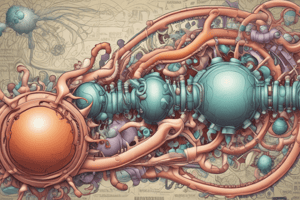Podcast
Questions and Answers
What is the role of enzymes from the exocrine glands of the pancreas in digestion?
What is the role of enzymes from the exocrine glands of the pancreas in digestion?
- Break down nucleic acids into nucleotides
- Break down carbohydrates into simple sugars
- Break down fats into fatty acids and monoglycerides (correct)
- Break down proteins into amino acids
Which organ is responsible for the absorption of the majority of nutrient molecules?
Which organ is responsible for the absorption of the majority of nutrient molecules?
- Large Intestine
- Stomach
- Mouth
- Small Intestine (correct)
What is the function of the salivary glands in digestion?
What is the function of the salivary glands in digestion?
- Churning and mixing of food with hydrochloric acid (HCl)
- Break down nucleic acids into nucleotides
- Ingestion and secretion of enzymes to break down carbohydrates, proteins, lipids, RNA, and DNA
- Secrete digestive enzymes for carbohydrate breakdown (correct)
What is the primary role of the stomach in the digestive process?
What is the primary role of the stomach in the digestive process?
Where is water absorbed in the digestive system?
Where is water absorbed in the digestive system?
What is the primary function of mechanical digestion?
What is the primary function of mechanical digestion?
Where does chemical digestion primarily take place?
Where does chemical digestion primarily take place?
Which organ contains enzymes that start breaking down carbohydrates and fats during mechanical digestion?
Which organ contains enzymes that start breaking down carbohydrates and fats during mechanical digestion?
What is the purpose of chemical digestion?
What is the purpose of chemical digestion?
What is the role of enzymes in digestion?
What is the role of enzymes in digestion?
Flashcards are hidden until you start studying
Study Notes
Digestion: Mechanical and Chemical Processes
Digestion is the process of mechanically and enzymatically breaking down food into substances that can be absorbed into the bloodstream. It involves several subtopics, including mechanical digestion, chemical digestion, enzymes involved, and organs involved in the process.
Mechanical Digestion
Mechanical digestion involves physically breaking down food substances into smaller particles. This process begins with ingestion, where food is chewed and mixed with saliva, which contains enzymes that start breaking down carbohydrates and fats. As food travels through the gastrointestinal tract, it is further broken down by muscle contractions and the action of the gastrointestinal (GI) system. Mechanical digestion is necessary to prepare food for chemical digestion, which occurs when enzymes break down the nutrients in food.
Chemical Digestion
Chemical digestion is the biochemical process in which macromolecules in food are changed into simpler molecules. It is essential for the absorption of nutrients, as it breaks down carbohydrates, proteins, lipids, and nucleic acids into smaller, absorbable units. Chemical digestion primarily takes place in the small intestine, where enzymes from the pancreas and the brush border of the intestinal epithelium further degrade food into its simplest forms.
Enzymes Involved in Digestion
Several enzymes are involved in the digestive process, including those from the salivary and lingual glands, the stomach, and the exocrine glands of the pancreas. These enzymes help break down the major food macronutrients:
- Carbohydrates: Into simple sugars
- Proteins: Into amino acids
- Fats: Into fatty acids and monoglycerides
- Nucleic acids: Into nucleotides
Organs Involved in Digestion
The digestive process involves several organs, including:
- Mouth: Ingestion and the presence of salivary glands containing digestive enzymes
- Stomach: Churning and mixing of food with hydrochloric acid (HCl) and enzymes that digest proteins
- Small Intestine: Absorption of nutrients, including carbohydrates, proteins, and fats
- Large Intestine: Absorption of water, electrolytes, and elimination of feces
- Pancreas: Secretion of enzymes to break down carbohydrates, proteins, lipids, RNA, and DNA
Absorption of Nutrients
After mechanical and chemical digestion, the body absorbs nutrients, minerals, vitamins, and fluids from the gastrointestinal tract. The small intestine is responsible for the absorption of the majority of nutrient molecules, while some substances, such as water, are absorbed in the stomach and large intestine. Once absorbed, these nutrients can be used by cells in the body for energy and growth.
Studying That Suits You
Use AI to generate personalized quizzes and flashcards to suit your learning preferences.




